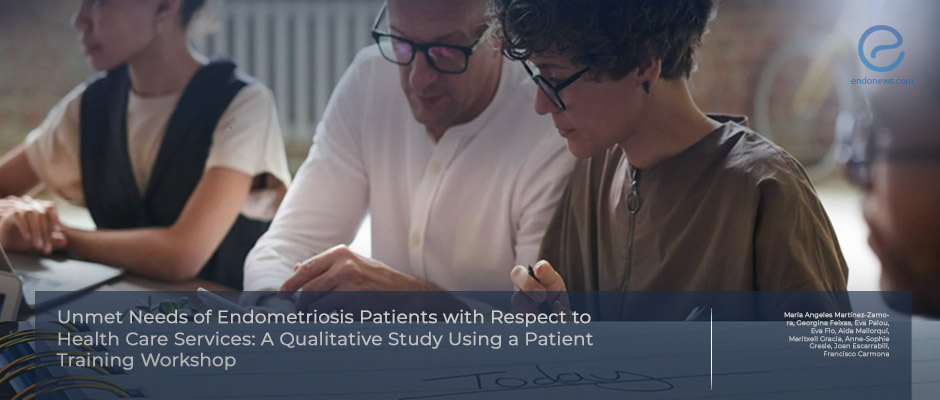Patient Voices Highlight Barriers in Endometriosis Management
Nov 25, 2025
Women with endometriosis identify priority areas for improving the healthcare experience.
Key Points
Highlights:
- A structured patient co-production workshop revealed multiple unmet needs across the endometriosis care pathway.
- Participants identified gaps in communication, care coordination, and empowerment within the healthcare system.
Importance:
- Understanding patient-defined priorities is essential for improving diagnostic pathways, communication standards, and long-term support for individuals with endometriosis.
What’s done here:
- Researchers conducted a two-day training and co-production program with endometriosis patients recruited from a tertiary referral center.
- Using participatory activities, the team gathered patient perspectives on barriers, unmet needs, and opportunities for improving care.
- Themes were synthesized into actionable domains to guide future service development.
Key results:
Patients identified four priority domains:
- Enhancing patient care quality and coordination, including timely diagnosis and multidisciplinary pathways.
- Improving information and communication, highlighting unclear messaging and inconsistent guidance.
- Strengthening training for both healthcare professionals and patients, emphasizing knowledge gaps across specialties.
- Encouraging active patient participation, including shared decision-making and self-advocacy in clinical encounters.
Strength and Limitations:
- Strength of the study is to provide patient-centered insights using a structured participatory methodology, which is rarely applied in endometriosis research.
- The sample was drawn from a tertiary referral center, limiting generalizability, and the findings do not constitute evidence-based clinical recommendations.
From the Editor-in-Chief – EndoNews
"This study offers an important reminder that understanding endometriosis requires more than clinical expertise—it demands deliberate engagement with the lived experiences of patients. By applying a structured participatory action research framework, the authors demonstrate how patient-generated insights can uncover care gaps that traditional research methodologies consistently overlook.
Several aspects of this work are particularly noteworthy. First, the study elevates patient participation from feedback to co-production, a methodological shift that remains rare in endometriosis research but is essential for designing responsive, effective care pathways. Second, the use of the nominal group technique provides a systematic and reproducible approach to extracting priorities from complex personal experiences. This strengthens the validity of the findings despite the study’s qualitative nature.
Critically, the themes identified—deficiencies in care coordination, communication, professional training, and patient engagement—mirror global concerns raised across diverse healthcare systems. This convergence underscores the systemic nature of unmet needs in endometriosis care and highlights the urgent need for health-service redesign driven by multidisciplinary collaboration.
Moving forward, the challenge lies in converting these insights into actionable structural reforms. This will require investment in provider education, standardized communication tools, co-designed patient resources, and integration of patient-reported outcomes into routine care. Importantly, participatory research must transition from isolated projects to embedded practice, informing clinical guidelines, service planning, and health-policy development.
Overall, this work is a compelling demonstration of how patient-centered methodologies can enrich our understanding of endometriosis care and should inspire broader adoption of co-production models across the field.
Lay Summary
Collaboration between patients with endometriosis and healthcare professionals can meaningfully illuminate gaps in care, according to a new study by Spanish researchers published in the Journal of Clinical Medicine.
Led by Dr. Francisco Carmona of the Hospital Clinic of Barcelona and the University of Barcelona, the team used a participatory action research approach—a method that actively engages patients as contributors rather than as passive subjects—to better understand the unmet needs of individuals living with endometriosis.
Eighteen patients were selected through purposive sampling and participated in a structured two-day training workshop designed to build confidence, facilitate open dialogue, and equip them with tools to articulate their experiences. Each session included guided discussions focused on different aspects of their care, and insights were collected using the nominal group technique—a qualitative method that allows participants to independently generate, prioritize, and refine ideas. Results were then triangulated to ensure reliability.
The participants identified four major areas requiring improvement:
• Patient care pathways, including access, coordination, and timeliness
• Information and communication, with emphasis on clear explanations and shared decision-making
• Training for healthcare professionals and patients, highlighting the need for updated clinical knowledge and patient education
• Active inclusion of patients in healthcare processes, encouraging co-decision and self-advocacy
Overall, the study demonstrates that structured patient involvement can reveal important gaps not captured by traditional clinical research approaches. It reinforces that endometriosis care must evolve toward more patient-centered, transparent, and participatory models, with the voices of patients playing a central role in shaping future improvements.
unmet needs
endometriosis care
patient training
healthcare
DISCLAIMER
EndoNews highlights the latest peer-reviewed scientific research and medical literature that focuses on endometriosis. We are unbiased in our summaries of recently-published endometriosis research. EndoNews does not provide medical advice or opinions on the best form of treatment. We highly stress the importance of not using EndoNews as a substitute for seeking an experienced physician.


